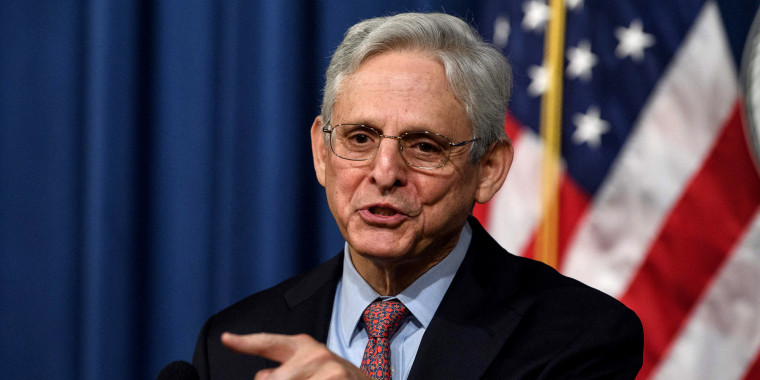First there were the reports Sunday that former President Donald Trump may announce a 2024 run for president as soon as September in the hopes of shielding himself from criminal prosecution. Then came Monday night’s report via MSNBC’s Rachel Maddow about a May 25 memo from Attorney General Merrick Garland extending a 2020 rule from then-Attorney General Bill Barr that established additional hurdles to open an investigation into an announced candidate for president.
Garland’s memo extending Barr’s rule doesn’t mean Trump can’t be investigated or charged if he formally announces a run for president.
These two stories caused many of us who want to see Trump held accountable for his potential crimes to reach for the antacid.
The House Jan. 6 committee held its eighth public hearing on Thursday. See how it unfolded.
As a practical matter, though, Garland’s memo extending Barr’s rule doesn’t mean Trump can’t be investigated or charged if he formally announces a run for president. The memo simply mandates that no investigation of a “declared candidate for president or vice president” can be initiated without the “prior written approval” of the attorney general. It only means Garland must personally sign off on any such investigation. (The remainder of Garland’s memo was a standard reminder given by past attorney generals in election years to Department of Justice employees to be “particularly sensitive”to safeguarding the DOJ’s reputation for “fairness, neutrality, and non-partisanship.”)
The Justice Department has a general policy to not give the impression of interfering in elections. Even so, in recent years numerous candidates were indicted by federal grand juries within months of an election. Just last month, federal prosecutors convinced a grand jury to charge a Republican candidate for governor in Michigan with Jan. 6- related crimes: Ryan Kelley stands accused of climbing the walls outside the U.S. Capitol, entering the North West Courtyard and “using his hands to support another rioter who is pulling the metal barricade.” He was charged three months before the GOP primary elections scheduled for Aug. 2. Kelley pleaded not guilty and remains on the ballot.
It's laughable for Trump to think he could avoid prosecution by announcing a run for president. For starters, his ruse would be apparent if he declared in September, 15 months before January 2024 when Iowa is scheduled to hold its caucuses. On June 16, 2015, when Trump slithered down the escalator to announce his candidacy, Iowa was a little over seven months away.
Charging Trump to further a partisan political agenda would be wrong and dangerous for our republic. Conversely, not charging Trump for his apparent crimes because of political concerns would be even more wrong and perilous.
Lisa Monaco, the Justice Department’s second-ranking official, rejected the idea Tuesday that Trump becoming a formal candidate would deter DOJ from investigating him. In response to that very question, Monaco stated bluntly: “We’re going to continue to do our job, to follow the facts wherever they go, no matter where they lead, no matter to what level.” She added, “We’re going to continue to investigate what was fundamentally an attack on our democracy.”
And on Wednesday, Garland himself reiterated at a news conference, responding to a question about the prospects of charging Trump, that “no person” is above the law. Garland echoed Monaco’s sentiment, stating, “We have to hold accountable every person who is criminally responsible for trying to overturn a legitimate election, and we must do it in a way filled with integrity and professionalism."
Adding to Trump’s concerns that the DOJ will charge him even as a declared candidate are the 2018 indictments of two congressional candidates just a few months before that year’s midterm elections. Rep. Chris Collins, R-N.Y., was charged with various crimes connected to allegations that he had engaged in insider stock trading. Weeks later, DOJ announced a host of criminal charges against Rep. Duncan Hunter, R-Calif., connected to his use of campaign contributions to fund a lavish lifestyle, which included trips to Italy, Hawaii and London.
Both were locked in re-election battles in a year Democrats were expected to (and did) pick up House seats and win back control of the House. Hunter initially took a page from Trump’s playbook by describing his charges as “politically motivated” and claiming to have been unfairly targeted by the “new Department of Justice” and “the Democrats’ arm of law enforcement.”
Despite the protestations of their innocence and their assertions to fight charges they called meritless, Collins and Hunter later pleaded guilty and resigned from Congress. Duncan was sentenced to 11 months in prison and Collins to 26 months.
The bottom line is that Trump can announce that he’s running whenever he wants to. But as recent history tells us, DOJ would not be prevented from prosecuting him for any potential crimes — even if primary elections or a general election are approaching.
Now it’s up to Garland. My hope is that he lives up to the words of his May 25 memo, in which he wrote that “partisan politics must play no role in the decisions of federal investigators or prosecutors regarding any investigations or criminal charges.” Charging Trump to further a partisan political agenda would be wrong and dangerous for our republic. Conversely, not charging Trump for his apparent crimes because of political concerns would be even more wrong and perilous.

